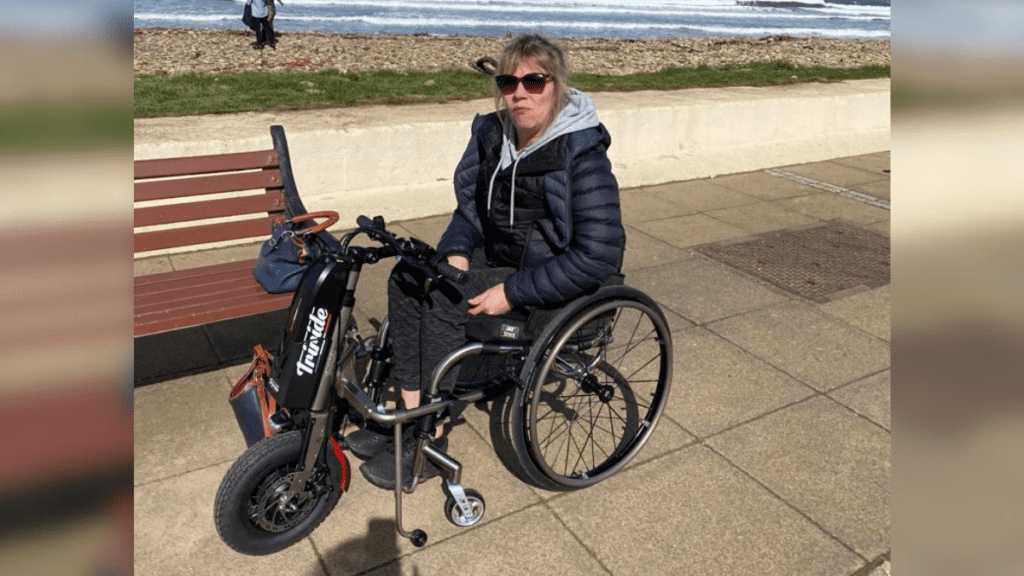Julie’s story: Getting independent and back to work
9 May 2023

Meet Julie:
- Formerly worked with the police before sustaining her spinal cord injury
- Now works with the NHS after using our employment service
- Was supported by a Back Up mentor, who gave her advice for living independently with a spinal cord injury
Every spinal cord injury is as unique as the person who sustains it. In Julie’s case, a long-term condition lead to life-changing damage to her spinal cord in early 2021. Julie had been living with Syringomyelia – a neurological condition where a cyst forms within the spinal cord – for years, but over time her condition deteriorated. This eventually damaged her spinal cord at the C6, T8, and T9 vertebrae.
After this happened, Julie’s life changed near instantly.
“It was a shock. I was doing a yoga class over Zoom that night, and my legs just stopped moving. I have not been able to walk since. “
As someone who truly valued her independence, the impact of Julie’s injury was devastating. She went from being active and independent to facing a long time in hospital at the height of the Covid-19 pandemic.
One of the hardest things Julie faced at this time was a lack of dedicated support for people with a spinal cord injury. Charities, including Back Up, were not able to deliver usual services on the ward due to lockdown restrictions, leading to a knowledge gap in many newly injured people at this time.
“We weren’t even allowed visitors at the time – it affected my mental health quite badly.
“When I was discharged, I left hospital with no support or knowledge about living independently with a spinal cord injury.”
Fortunately, Back Up was there to support Julie when she returned home. After she got in touch with our team, we paired Julie up with one of our trained mentors. Through this service, Julie learned essential knowledge and skills for living life to the full.
“When you’re newly injured it’s very difficult. It’s not just your mobility that is affected with spinal cord injury – bladder and bowel care can be a worry too.
“My mentor taught me that living well is about baby steps at first. For me, that meant sorting myself out with a new wheelchair to replace the one provided to me by the NHS. My mentor showed me how the process of getting a new wheelchair worked, which helps me live independently now.”
Once she found the right mobility aid for herself, one of the last pieces of the puzzle for Julie to regain her independence was getting back to work. Work was a big part of Julie’s life prior to her injury, having spent 30 years in service with the police. Back Up’s employment service gave Julie the confidence needed to thrive in the workplace after spinal cord injury.
“The Skills for Work course was really good. The team shared practical tips for applying to jobs after spinal cord injury, from tailoring your CV to the understanding the interview process.
“Before this course I didn’t think anyone would employ me as a wheelchair user. Back Up proved to me that working independently was still possible – I just had to go out there and get it!”
As a result of our Skills for Work course, Julie is back at work in a new role in the NHS – perfect for someone who has worked in public services for as long as she has. Julie says that she would recommend our employment services for anyone with a spinal cord injury – getting back to work has truly helped her rediscover her independence.
“Work gives you a big sense of self worth, helps you meet new people, and is a great way to have a routine.
“Back Up have been absolutely fabulous. I feel like I’m part of the community again.”
We’re glad that Julie was able to boost her independence through our services. If you’d like the chance to get back to work after spinal cord injury, learn more here.


